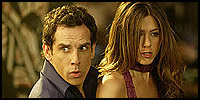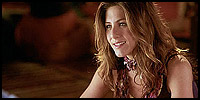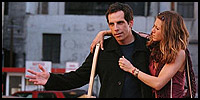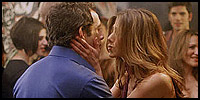
 |
|
Along Came Polly (2004) Cast: Ben Stiller, Jennifer Aniston, Phillip Seymour Hoffman, Debra Messing, Alec Baldwin, Bryan Brown, Hank Azaria, Jsu Garcia, Michele Lee, Bob Dishy, Missi Pyle, Judah Friedlander, Kym E. Whitley, Caroline Aaron 2004 – 90 minutes Rated: Reviewed by Dustin Putman, January 17, 2004.  "Along Came Polly" aspires to be both a love story and an outrageous comedy, a'la "There's Something About Mary" (even the title none so subtly recalls that 1998 Farrelly brothers hit), but writer-director John Hamburg fails to achieve such a feat. The romance is implausible and unconvincing, while the humor never quite takes flight to achieve its comedic capabilities. What is left, then, is a purely formulaic romantic comedy not fresh or memorable enough to garner an identity of its own.
"Along Came Polly" aspires to be both a love story and an outrageous comedy, a'la "There's Something About Mary" (even the title none so subtly recalls that 1998 Farrelly brothers hit), but writer-director John Hamburg fails to achieve such a feat. The romance is implausible and unconvincing, while the humor never quite takes flight to achieve its comedic capabilities. What is left, then, is a purely formulaic romantic comedy not fresh or memorable enough to garner an identity of its own.
 When Reuben Feffer (Ben Stiller) gets married to the lovely Lisa Kramer (a wasted Debra Messing), they follow it up with what is supposed to be an ideal tropical honeymoon. Instead, things take a disastrous turn when Reuben catches Lisa cheating on him with their hunky scuba instructor, Claude (Hank Azaria). Broken up over a marriage that ended before it had a chance to begin (think Britney Spears' recent Las Vegas nuptials), Reuben returns to his New York City job as a risk assessment analyst.
When Reuben Feffer (Ben Stiller) gets married to the lovely Lisa Kramer (a wasted Debra Messing), they follow it up with what is supposed to be an ideal tropical honeymoon. Instead, things take a disastrous turn when Reuben catches Lisa cheating on him with their hunky scuba instructor, Claude (Hank Azaria). Broken up over a marriage that ended before it had a chance to begin (think Britney Spears' recent Las Vegas nuptials), Reuben returns to his New York City job as a risk assessment analyst.
 At a party with best friend Sandy (Phillip Seymour Hoffman), Reuben has a chance encounter with junior high pal Polly Prince (Jennifer Aniston). Polly is a decidedly flighty eternal free spirit, and Reuben lives his life through schedules and order, but her exact opposite disposition on life is the very thing that immediately draws himself to her. As Reuben suffers in the name of love, going to Polly's favorite Indian restaurants (he can't handle spicy foods) and learning salsa dancing, their relationship hits its first blow with the reappearance of Lisa, who wants a second chance.
At a party with best friend Sandy (Phillip Seymour Hoffman), Reuben has a chance encounter with junior high pal Polly Prince (Jennifer Aniston). Polly is a decidedly flighty eternal free spirit, and Reuben lives his life through schedules and order, but her exact opposite disposition on life is the very thing that immediately draws himself to her. As Reuben suffers in the name of love, going to Polly's favorite Indian restaurants (he can't handle spicy foods) and learning salsa dancing, their relationship hits its first blow with the reappearance of Lisa, who wants a second chance.
 "Along Came Polly" is predictable—maybe more so than the norm because if you've seen the theatrical trailer, you've basically seen the whole movie—but so are most films of this genre. Instead, the picture's fatal mistake is that, regardless of how energetic the cast is, the romance doesn't work on any level. On their own, Reuben and Polly are original enough character creations, with Reuben a by-the-book straight arrow who assessing every possible risk in life through a percentage and Polly a joyfully disorganized gypsy who never stays in one place long enough to get bored. Together, they fit about as well as two unrelated jigsaw puzzle pieces. While one can possibly believe Reuben might be attracted to Polly's liberated ways, there is no reason given for why Polly would even glance in Reuben's direction twice. The connection between these two people is never palpably felt, nor is there any heat or chemistry. Because of this sad fact, the romance—indeed, the whole point of its existence—flounders miserably.
"Along Came Polly" is predictable—maybe more so than the norm because if you've seen the theatrical trailer, you've basically seen the whole movie—but so are most films of this genre. Instead, the picture's fatal mistake is that, regardless of how energetic the cast is, the romance doesn't work on any level. On their own, Reuben and Polly are original enough character creations, with Reuben a by-the-book straight arrow who assessing every possible risk in life through a percentage and Polly a joyfully disorganized gypsy who never stays in one place long enough to get bored. Together, they fit about as well as two unrelated jigsaw puzzle pieces. While one can possibly believe Reuben might be attracted to Polly's liberated ways, there is no reason given for why Polly would even glance in Reuben's direction twice. The connection between these two people is never palpably felt, nor is there any heat or chemistry. Because of this sad fact, the romance—indeed, the whole point of its existence—flounders miserably.
 What does work, and what makes the viewing experience a passable, if not worthwhile, one, is the sharp character work by a few of its supporting players. Phillip Seymour Hoffman (2002's "25th Hour") can do no wrong, and does it again here as Sandy Lyle, a former child star who in his adulthood has clung to the fame achieved from a sole film appearance in a "Breakfast Club"-style teen flick. Hoffman is at his quirky best, wavering between truthful pathos and successful comedic flourishes (as when, playing Judas, he takes it upon himself to sing Jesus' empowering musical number in an off-Broadway production of "Jesus Christ Superstar"). As Leland, a client of Reuben's who with every daredevil stunt he partakes in plummets his chances of being insured by the company, Bryan Brown also stands out, bringing a daffy likability to a person oblivious to the danger he constantly puts himself in.
What does work, and what makes the viewing experience a passable, if not worthwhile, one, is the sharp character work by a few of its supporting players. Phillip Seymour Hoffman (2002's "25th Hour") can do no wrong, and does it again here as Sandy Lyle, a former child star who in his adulthood has clung to the fame achieved from a sole film appearance in a "Breakfast Club"-style teen flick. Hoffman is at his quirky best, wavering between truthful pathos and successful comedic flourishes (as when, playing Judas, he takes it upon himself to sing Jesus' empowering musical number in an off-Broadway production of "Jesus Christ Superstar"). As Leland, a client of Reuben's who with every daredevil stunt he partakes in plummets his chances of being insured by the company, Bryan Brown also stands out, bringing a daffy likability to a person oblivious to the danger he constantly puts himself in.
 As main attractions Reuben and Polly, Ben Stiller (2003's "Duplex") and Jennifer Aniston (2003's "Bruce Almighty") are also good, but these frothy, undemanding parts are so beneath them it almost hurts. Stiller, a warm and funny presence with impeccable comic timing, has begun to repeat himself too often. And Aniston, who delivered the most powerful performance of 2002 in "The Good Girl," has followed up this success with two phoned-in love interest roles. Aniston's Polly may be a part of the film's title, but she never breaks free of one dimension and shows no satisfying growth by the end, aside from what the plot has demanded she do. And Polly's consistent noncommittal attitude toward everything she does stops being endearing midway through and becomes downright frustrating. By the conclusion, when she threatens to move away again simply because of her conflict with Reuben, you have half a notion to slap some sense into Polly. This likely wasn't the response writer-director John Hamburg was going for, but that is exactly how he has clumsily constructed this character.
As main attractions Reuben and Polly, Ben Stiller (2003's "Duplex") and Jennifer Aniston (2003's "Bruce Almighty") are also good, but these frothy, undemanding parts are so beneath them it almost hurts. Stiller, a warm and funny presence with impeccable comic timing, has begun to repeat himself too often. And Aniston, who delivered the most powerful performance of 2002 in "The Good Girl," has followed up this success with two phoned-in love interest roles. Aniston's Polly may be a part of the film's title, but she never breaks free of one dimension and shows no satisfying growth by the end, aside from what the plot has demanded she do. And Polly's consistent noncommittal attitude toward everything she does stops being endearing midway through and becomes downright frustrating. By the conclusion, when she threatens to move away again simply because of her conflict with Reuben, you have half a notion to slap some sense into Polly. This likely wasn't the response writer-director John Hamburg was going for, but that is exactly how he has clumsily constructed this character.
 "Along Came Polly" has a few laughs, including the long-overdue definition of what a "shart" is, but they come and go without a whole lot of impact. The film, as a whole, falls victim to the same quandary. The machinations of the plot creak along as one cliched and unextraordinary event follows the next. As for the love story between Reuben and Polly, it is stillborn. There's nothing particularly terrible about "Along Came Polly," but, save for a handful of performances, nothing particularly good, either.
"Along Came Polly" has a few laughs, including the long-overdue definition of what a "shart" is, but they come and go without a whole lot of impact. The film, as a whole, falls victim to the same quandary. The machinations of the plot creak along as one cliched and unextraordinary event follows the next. As for the love story between Reuben and Polly, it is stillborn. There's nothing particularly terrible about "Along Came Polly," but, save for a handful of performances, nothing particularly good, either.
|
© 2004 by Dustin Putman |














